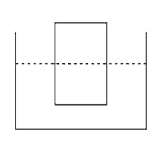The density of a liquid of coefficient of cubical expansion γ is ρ at 0∘C when the liquid is heated to a temp T, the change in density will be
−ργT1+γT
ργT1+γT
−1+γTγT
γ1+γTγT
The correct Answer is:A
ρ−ρt=γρtT,ρ−ρt=γTρ(1+γT)
When temperature increases density decreases
Topper's Solved these Questions
- THERMAL PROPERTIES OF MATTERBook:NARAYNAChapter:THERMAL PROPERTIES OF MATTERExercise:LEVEL-I (C.W.)
Explore 23 Videos
- THERMAL PROPERTIES OF MATTERBook:NARAYNAChapter:THERMAL PROPERTIES OF MATTERExercise:LEVEL-II (C.W.)
Explore 27 Videos
- THERMAL PROPERTIES OF MATTERBook:NARAYNAChapter:THERMAL PROPERTIES OF MATTERExercise:Examples
Explore 50 Videos
- SYSTEM OF PARTICLES AND ROTATIONAL MOTION Book:NARAYNAChapter:SYSTEM OF PARTICLES AND ROTATIONAL MOTION Exercise:EXERCISE - IV
Explore 39 Videos
- THERMODYNAMICSBook:NARAYNAChapter:THERMODYNAMICSExercise:Exercise
Explore 187 Videos
Similar Questions
A cylinder isotropic solid of coefficient of thermal expansion α and density ρ (at STP) floats in a liquid of coefficient of volume expansion γ and density d (at STP) as shown in the diagram.

View SolutionA liquid (coefficient of cubical expansion γ1) is contained in a glass vessel of volume V0 (coefficient of cubical expansion γg) at a temperature. The volume of liquid at this temperature is Vl. Now the system is heated and it is found that at all temperatures, the volume of vessel, unoccupied by liquid remains always same, then
View Solution
Knowledge Check
On heating a liquid of coefficient of cubical expansion γ in a container having coefficient of linear expansion γ/3. The level of liquid in the container will
AriseBfallCwill remain almost stationaryDit is difficult to sayA vessel is partly filled with a liquid. Coefficients of cubical expansion of material of the vessel and liquid are γv unoccupied by the liquid will necessarily
Aremain unchanged if γv=γLBincrease if γv=γLCdecrease if γv=γLDnone of the aboveWhen solid is heated , its length changes according to the relation l=l0(1+αΔT) , where l is the final length , l0 is the initial length , ΔT is the change in temperature , and α is the coefficient of linear is called super - facial expansion. the area changes according to the relation A=A0(1+βΔT), where A is the tinal area , A0 is the initial area, and β is the coefficient of areal expansion.
On heating a liquid of coefficient of cubical or volume expansion γ in a container having coefficient of linear expansion γ/3 , the level of liquid in the containerArises.Bfalls .Cremain almost stationaryDnone of these .
A liquid with coefficient of real volume expansion (γ) is filled in vessel of coefficient of linear expansion γ3. When the systeam is heated then.
a) The volume of spece above liquid remains same.
b) The level of liquid relative to vessel reamins same.
c) The fraction of volume of liquid in vessel reamains same.
View SolutionThe coefficient of real expansion γR of a liquid is 5 times the coefficient of linear expansion of the material of the container in which the liquid is present. The ratio is of the cofficient of apparent expansion and real expansion of the liquid is
View SolutionIf coefficient of real expansion of a liquid is 15500/0C. The temperature at which its density is 1% less than density at 00C is
View SolutionA sphere of diameter 8cm and mass 275g floats in a bath of liquid. As the temperature is raised, the sphere begins to sink at a temperature of 400C. If the density of the liquid is 1.5g/cm3 at 00C, find the coefficient of cubical expansion of the liquid. Neglect the expansion of the sphere
View SolutionA solid with coefficient of linear expansion aplha just floats in a liquid whose coefficient of volume expansion is γ . If the system is heated, the solid will
View Solution

